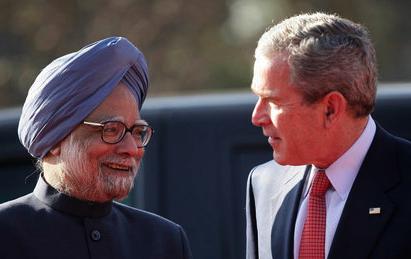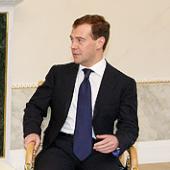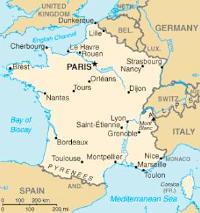Another common China theme is the question of what its growing military budget reveals about its regional and global ambitions. Writing in the current issue of The Washington Quarterly, MIT’s M. Taylor Fravel argues that instead of arguing backwards from worst case scenario assumptions, we should use China’s increasing transparency about its military doctrine as a window into what’s driving its military buildup. He identifies five principle strategic goals found in speeches by Chinese military policy makers and Chinese military scholarship: regime security, territorial integrity, national unification (preventing Taiwan’s secession), maritime security and regional stability. He then analyzes the elements […]
Asia-Pacific Archive
Free Newsletter
We’re used to reading about China in the context of increasing competition for scarce natural resources, most notably energy, iron and eventually water. Now Gérard-François Dumont, in a French-language article over at DiploWeb, reminds us that as an indirect consequence of its demographic campaign to limit population growth, China’s facing a shortage of a pretty essential human resource: girls. According to Dumont, in every five-year age bracket from birth to post-adolescence (0-4, 5-9, 10-14, 15-19), there are at least five million more Chinese boys than girls. The potential internal consequences range from domestic societal instability, an aging population on the […]
The New York Times reports that the most dire predictions about the effects of Cyclone Nargis on the Burmese people have not occurred: . . . doctors and aid workers returning from remote areas of the [Irrawaddy] delta are offering a less pessimistic picture of the human cost of the delay in reaching survivors. They say they have seen no signs of starvation or widespread outbreaks of disease. While it is estimated that the cyclone may have killed 130,000 people, the number of lives lost specifically because of the junta’s slow response to the disaster appears to have been smaller […]

Last week, the Supreme Court once again waded into the murky legal waters of the War on Terror. In Boumediene v. Bush, a deeply divided court struck down a provision of the Detainee Treatment Act that limited the access to judicial review by detainees in Guantanamo seeking to challenge their classification as “enemy combatants.” The legal rationale for this decision, although controversial, was not complicated: aliens held by the United States in areas where the U.S. exercises sovereignty are protected by the Constitution; Guantanamo is within the de facto sovereignty of the United States; the Congress had not suspended the […]

CHITWAN and KATMANDU, Nepal — Four years ago, Hardik dropped out of his university-level science studies in the Nepali capital, Katmandu, to join Maoist insurgents in the bush. Admittedly scared sick at first, he said the rigors of guerilla warfare hardened his resolve to oust a ruling monarchy hopelessly out of touch with Nepal’s poverty. Today Hardik is one of more than 23,000 members of the People’s Liberation Army idling in U.N.-monitored ceasefire camps, where weapons are locked away and his free time is spent doing English grammar exercises or playing the flute. “There is no such thing as perpetual […]

DENPASAR, Indonesia — Opinion polls indicate that President Susilo Bambang Yudhoyono remains Indonesia’s most popular politician. This is not little comfort for the man who has helmed the country for the last four years and is set to contest for a second term in 2009. But it is not all good news for the former four-star general. Accusations of religious intolerance have continued to gain ground in Indonesia and, in the next few days, Yudhoyono is expected to make two potentially contentious rulings on religious matters. Yudhoyono has been called on to decide whether to ban Ahmadiyah, a religious sect […]
The first I heard that New York City’s manhole covers were made in India was in this offhanded TPM post by Josh Marshall last November. Now it turns out that Indian-made manhole covers are being stolen (from America, but also from Europe and Mumbai) because of the Peking Olympics. 2point6billion.com’s got the details, including what to do about the safety risk of open sewer manholes.

With a whimper went President Bush’s last, best chance for a positive legacy in international affairs. Last week administration officials conceded to the Financial Times that India would not approve a nuclear cooperation pact with Washington during Bush’s tenure. In March 2006, President Bush signed a nuclear agreement in New Delhi designed to pull the world’s largest democracy closer to the world’s last superpower and dramatically alter Asia’s balance of power. With Asia’s economic rise, it is widely assumed that the continent’s political emergence will follow in the coming decades. By agreeing to cooperate with India on nuclear issues — […]
According to RIA Novosti, Russia-China trade rose 44 percent year on year, to $48 billion last year. Not surprisingly, 90 percent of Russian exports to China consisted of energy products and raw materials, while 40 percent of Chinese exports to Russia were engineering or electronic products. Again, in some ways this kind of reinforcement of bilateral ties among strategic rivals represents a threat to America’s interests. But in other, broader ways, it lessens the potential for a conflict between them that could threaten the stability of the global order. With regard to the more specific question of how China’s growing […]

On June 6, Dmitry Medvedev presided over his first major multinational meetings since replacing Vladimir Putin as Russia’s president on May 7. The first gathering involved an “informal” summit of the heads of state of the Moscow-led Commonwealth of Independent States (CIS). The second was the annual meeting of the St. Petersburg International Economic Forum, which attracts many foreign diplomats and business executives. At the meetings, Medvedev eschewed the sarcastic and at times menacing rhetoric of his predecessor. He also seemed slightly more open to resolving Russia’s differences with Georgia. Yet, Medvedev reaffirmed Putin’s hard-line position regarding NATO expansion and […]
The alarmist scenarios about China’s rise would worry me a lot more if the Chinese were hellbent on using globalization to slowly insinuate traditional Chinese culture on an unsuspecting world. Outside of tofu and soy sauce, though, that doesn’t seem to be the case. Instead, the Chinese elites seem much more interested in drinking French wine and buying contemporary art (albeit primarily Chinese contemporary art for the time being). To me, the tensions that continued globalization will inevitably raise between China (the government) and China (the people) seem by far more potentially alarming than those it will raise between China […]

America’s preoccupation in the Iraq and Afghanistan wars has significantly undermined its influence in the Asia-Pacific region. Much has been written about how China has attempted to fill the “American void” in the Asia-Pacific and to reconfigure the region’s geopolitical architecture, but little attention is being accorded to Russia’s new power plays in the region, which, if not appropriately understood, will have tremendous consequences for American interests. Over the past five years, Russia has been slowly repositioning itself in the Asia-Pacific through arms sales, participation in regional venues like the Six-Party Talks concerning North Korea’s nuclear program, and energy exports. […]

KATMANDU, Nepal — Nepal’s Maoist movement has no operational links with the leftist insurgents in India who also call themselves Maoists, the former guerilla army’s second-in-command said, dismissing the possibility of any future assistance for their political brethren to the south. “Political revolution is fixed within a border and we do not export it,” Commander Ananta said in an interview with World Politics Review earlier this month at Maoist party headquarters here. “The people of an independent country must decide themselves.” The Maoists’ landslide victory in last month’s general elections raised some concerns that leftist insurgents across the border in […]
A few years ago, Hampton’s post about democracy promotion and terrorism probably ran the risk of being twisted by unscrupulous critics into an apology for the terrorists. That got me thinking about the logical inconsistency employed by those who argued for democracy promotion, while denying that any real political grievances feed violent Islamic extremism. Fortunately, those days are over, and we can now discuss things as they exist in the real world. Hampton already mentioned all the caveats necessary when considering democracy promotion. To which Dan Drezner will apparently be adding one more in Congressional testimony tomorrow: sovereign wealth funds. […]
Or as the Indian Defense Minister put it: We are not ignoring (these incidents). To a maximum extent, we will try to avoid confrontation. Both Indian and Chinese culture have strong traditions of active detachment (I’m thinking of the Vedic and Buddhist traditions). In a lot of ways, Asia’s future rests on their ability to transcribe it into a geopolitical principle.

Part I: Series Introduction PARIS — Since the time of Gen. De Gaulle, France’s posture towards the United States can be summed up in the familiar expression, “Friend, ally, non-aligned.” A source of French pride and American distrust, the formula has haunted France’s historically stormy relationship with NATO, and served as the geopolitical expression of l’exception française, France’s cultural identity of exceptionalism. It took on added significance since the emergence of the European Union, of which France was and remains a driving force. The need to balance its two principle relationships — one a strategic alliance with political implications, the […]
With regard to what I called Earthquake Diplomacy, the flip side of the coin is the image management possibilities for the authorities of the country struck by the natural disaster. On the far side of the unfavorable range of the spectrum, you’ll find the Burma monsoon. Of course, Hurricane Katrina and the French heat wave of 2003 didn’t do either country any favors in terms of its public image, either. (I think reaction to the French heat wave, though, was more a global sense of “Whiskey Tango Foxtrot?” than outrage and horror. I had actually left France that summer for […]
